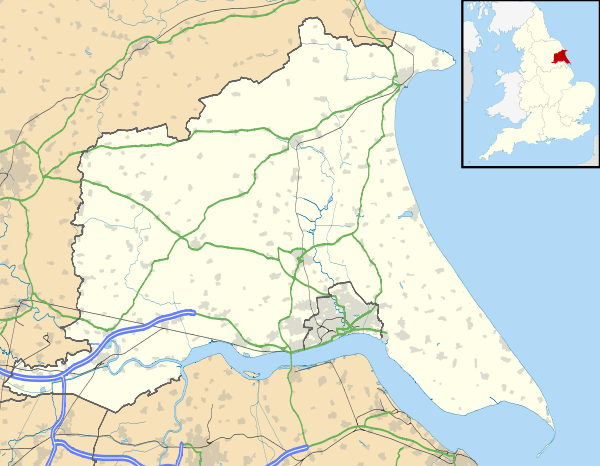Winestead
| Winestead | |
|---|---|
 St Germain's Church, Winestead | |
 Winestead | |
| Winestead shown within the East Riding of Yorkshire | |
| OS grid reference | TA299245 |
| • London | 155 mi (249 km) S |
| Civil parish | |
| Unitary authority | |
| Ceremonial county | |
| Region | |
| Country | England |
| Sovereign state | United Kingdom |
| Post town | HULL |
| Postcode district | HU12 |
| Dialling code | 01964 |
| Police | Humberside |
| Fire | Humberside |
| Ambulance | Yorkshire |
| EU Parliament | Yorkshire and the Humber |
| UK Parliament | |
Winestead is a village in the East Riding of Yorkshire, England, in an area known as Holderness. It is situated approximately 7 miles (11 km) south-east of the town of Hedon and 1.5 miles (2.4 km) north-west of the village of Patrington. It is situated to the north of the A1033 road. It forms part of the civil parish of Patrington.
It is also the ancient seat of the Hildyard/Hilliard/Hildegardis family, whose ancestry is believed to be of Saxon origin. The Hildyard family of Winestead became extinct on the death of Sir Robert D'Arcy Hildyard, Bart., who died without heirs in 1814. Hildyard bequeathed his estates to his niece, Ann Catherine Whyte, who married in the following year Thomas Blackborne Thoroton, Esq., of Flintham Hall, Flintham, Nottingham. Col. Thoroton of the Coldstream Guards subsequently assumed the name and coat-of-arms of Hildyard.[1] His heirs, who still have the surname Hildyard, reside at Flintham Hall today.[2] The Hildyard family lived at Winestead for 10 generations, and even after the death of the last Baronet, the heirs continued to own Winestead Hall.[3][4]
In 1823 inhabitants in the village numbered 129. Occupations included six farmers.[5]

The church of St Germain was designated a Grade I listed building in 1966 and is now recorded in the National Heritage List for England, maintained by Historic England.[6]
The White Hall was designated a Grade II* listed building in 1966 and is now recorded in the National Heritage List for England, maintained by Historic England.[7]
Winestead was served from 1854 to 1964 by Winestead railway station on the Hull and Holderness Railway.[8]
Andrew Marvell the metaphysical poet was born in the village.[9]
References
- ↑ "The Seats of Nobility, Gentry and Clergy in the East Riding of Yorkshire, 1840". White's Directory. 1840. Retrieved 2 November 2008.
Thomas Blackborne Thoroton Hildyard and his wife, the former Catherine Whyte, continued to reside part-time in Winestead after her move to Nottinghamshire
- ↑ "GENUKI: Winestead Parish information from Bulmers' 1892.". genuki.org.uk.
- ↑ East Riding Antiquarian Society (1899). Transactions. Vol. 7.
- ↑ "Dod's Parliamentary Companion". google.com.
- ↑ Baines, Edward (1823). History, Directory & Gazetteer of the County of York. pp. 400, 401. ISBN 1230139141.
- ↑ Historic England. "Church of St Germain (1161091)". National Heritage List for England. Retrieved 11 August 2013.
- ↑ Historic England. "The White Hall (1310373)". National Heritage List for England. Retrieved 16 August 2013.
- ↑ Butt, R. V. J. (1995). The Directory of Railway Stations: details every public and private passenger station, halt, platform and stopping place, past and present (1st ed.). Sparkford: Patrick Stephens Ltd. ISBN 978-1-85260-508-7. OCLC 60251199.
- ↑ Kelliher, W. H. (May 2008). "Marvell, Andrew (1621–1678)". Oxford Dictionary of National Biography. Oxford University Press. Retrieved 13 July 2013.Subscription or UK public library membership required
External links
| Wikimedia Commons has media related to Winestead. |
- Winestead in the Domesday Book